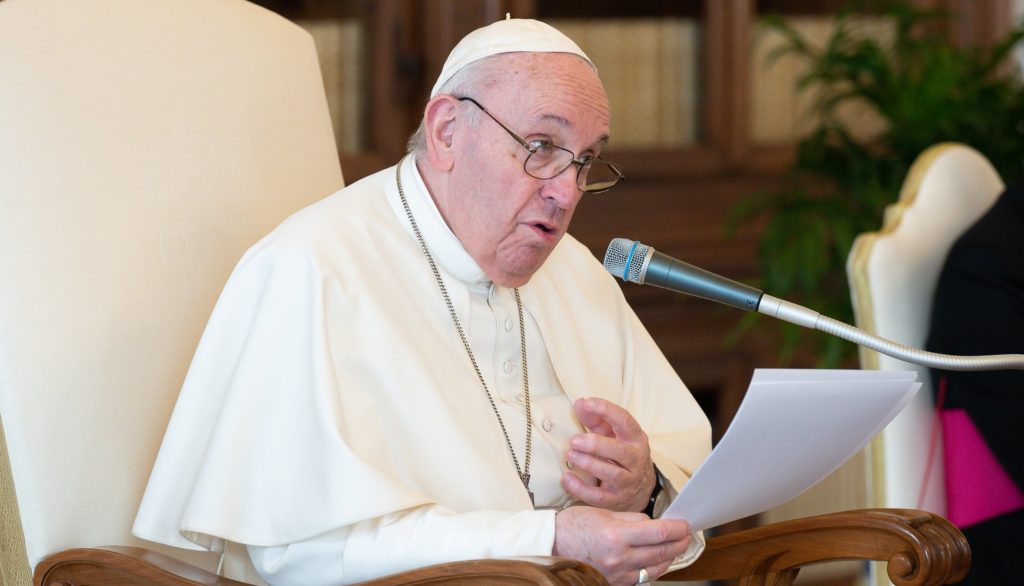At the first general audience of Easter 2021, Pope Francis reflects on the relationship between prayer and the communion of saints.
Francis began his catechesis by affirming that we never pray alone: "Today I would like to reflect on the relationship between prayer and the communion of saints. In fact, when we pray, we never pray alone: even if we do not think about it, we are immersed in a majestic river of invocations that precedes us and continues after us.
The sentence is diffusive
"In the prayers we find in the Bible," says the Pope, "and which often resound in the liturgy, we see the imprint of ancient stories, of prodigious liberations, of deportations and sad exiles, of moving returns, of praises poured out before the wonders of creation... And so these voices spread from generation to generation, in a continuous relationship between personal experience and that of the people and humanity to which we belong. In the prayer of praise, especially in that which springs from the hearts of the little ones and the humble, there resounds something of the canticle of the Magnificat which Mary raised to God before her kinswoman Elizabeth; or of the exclamation of the old man Simeon who, taking the Child Jesus in his arms, said: "Now, Lord, you are able, according to your word, to let your servant depart in peace" (Lc 2,29)".
He reminded the audience that "prayers - the good ones - are "diffusive", they spread continuously, with or without messages on "social networks": from hospital wards, from festive gatherings and even from moments of suffering in silence... The pain of each one is the pain of all, and the happiness of one is poured into the souls of others".
Praying with the saints
"Prayers are always reborn: every time we join hands and open our hearts to God, we find ourselves in the company of anonymous saints and recognized saints who pray with us, and who intercede for us, like older brothers and sisters who have gone through our same human adventure. In the Church there is no mourning that remains alone, no tear that is shed in oblivion, because everything breathes and participates in a common grace. It is not by chance that in the ancient churches the tombs were in the garden around the sacred building, as if to say that the multitude of those who preceded us participate in some way in every Eucharist. There are our parents and grandparents, our godfathers and godmothers, the catechists and other educators..."
The saints refer us to Jesus Christ, the Pope adds, "the saints are still here, not far from us; and their representations in the churches evoke that "cloud of witnesses" that always surrounds us (cf. Hb 12, 1). They are witnesses that we do not adore, of course, but that we venerate and that in a thousand different ways refer us to Jesus Christ, the only Lord and Mediator between God and man. They remind us that even in our lives, though weak and marked by sin, holiness can flourish. It is never too late to be converted to the Lord, good and great in love (cf. Salt 102, 8)".
Our deceased watch over us from Heaven
"The Catechism explains," Francis continues, "that the saints "contemplate God, praise him and do not cease to care for those left on earth. [Their intercession is their highest service to God's plan. We can and must pray to them to intercede for us and for the whole world" (CCE, 2683). In Christ there is a mysterious solidarity between those who have passed on to the next life and us pilgrims in this one: our deceased loved ones continue to watch over us from Heaven. They pray for us and we pray with them".
The bond of prayer is already experienced here, says the Pope, in earthly life: "We pray for one another, we ask and offer prayers... The first way to pray for someone is to talk to God about him or her. If we do this frequently, every day, our heart does not close, it remains open to our brothers and sisters. Praying for others is the first way to love them and pushes us to a concrete closeness".
Asking the saints for help
"The first way to face a moment of distress is to ask our brothers and sisters, especially the saints, to pray for us. The name we were given at Baptism is not a label or a decoration! It is usually the name of Our Lady, of a saint, or of a saint, who wants nothing more than to "lend us a hand" to obtain from God the graces we most need. If in our life the trials have not been too great, if we are still able to persevere, if in spite of everything we go forward with confidence, perhaps all this, more than to our merits, is due to the intercession of so many saints, some in Heaven, others pilgrims like us on earth, who have protected and accompanied us".
The Pope concludes his catechesis by praying precisely to the Lord: "Blessed be Jesus Christ, the only Savior of the world, together with this immense flowering of saints who populate the earth and who have made their lives a praise of God. For, as St. Basil affirmed, "the saint is for the Spirit a place of his own, since he offers himself to dwell with God and is called his temple" (Liber de Spiritu Sancto26, 62: PG 32, 184A; cf. CCE, 2684)".








